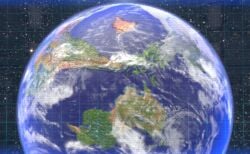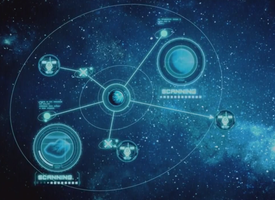Planet: Difference between revisions
m (→Koppai: Replaced pre-release screenshot with screenshot from the mp4.) |
(→Planets in the story: The Uji Ogura Plant has since been turned into the Nintendo Museum? I think. I dunno, but I think this makes more sense than just streets. Or poems.) |
||
| Line 131: | Line 131: | ||
===Ooji=== | ===Ooji=== | ||
Ooji is a planet introduced in {{p4}}, and is described as having a lush jungle and relaxing environment. Its name | Ooji is a planet introduced in {{p4}}, and is described as having a lush jungle and relaxing environment. Its name may come from Nintendo's Uji Ogura Plant or Uji Okubo Plant. | ||
The following characters are from Ooji: | The following characters are from Ooji: | ||
| Line 139: | Line 139: | ||
===Ogura=== | ===Ogura=== | ||
Ogura is a planet introduced in {{p4}}, however nothing is known about it currently. Its name comes from | Ogura is a planet introduced in {{p4}}, however nothing is known about it currently. Its name comes from Nintendo's Uji Ogura Plant, which was used for manufacturing playing cards and Hanafuda cards, and for product repairs. It has since been renovated into the {{w|Nintendo Museum}}. | ||
The following characters are from Ogura: | The following characters are from Ogura: | ||
| Line 158: | Line 158: | ||
===Ocobo=== | ===Ocobo=== | ||
Ocobo is a planet introduced in {{p4}}, and is described as being perpetually stormy, only have one day of clear sky every year. It has been completely flooded over by its rains resulting in its continents all being submerged, so its population lives on artificially made islands instead. Its name comes from | Ocobo is a planet introduced in {{p4}}, and is described as being perpetually stormy, only have one day of clear sky every year. It has been completely flooded over by its rains resulting in its continents all being submerged, so its population lives on artificially made islands instead. Its name comes from Nintendo's Uji Okubo Plant. | ||
The following characters are from Ocobo: | The following characters are from Ocobo: | ||
| Line 165: | Line 165: | ||
===Tagwa=== | ===Tagwa=== | ||
Tagwa is a planet introduced in {{p4}}. Not much is known about it, but it is suggested that the planet has run out of drinkable water. Its name may come from | Tagwa is a planet introduced in {{p4}}. Not much is known about it, but it is suggested that the planet has run out of drinkable water. Its name may come from {{w|Udagawachō}}, the district where Nintendo TOKYO, Japan's first Nintendo store, is located. | ||
The following characters are from Tagwa: | The following characters are from Tagwa: | ||
| Line 201: | Line 201: | ||
===Maxima=== | ===Maxima=== | ||
Maxima is a planet introduced in {{p4}}, however nothing is known about it currently. Its name comes from the Makishima area in Kyoto.{{cite web|rname=p4source}} | Maxima is a planet introduced in {{p4}}, however nothing is known about it currently. Its name comes from the Makishima area in Kyoto, where the Nintendo Museum is located.{{cite web|rname=p4source}} | ||
The following characters are from Maxima: | The following characters are from Maxima: | ||
Revision as of 18:38, August 24, 2024
The Pikmin series takes place over several planets. Some of these planets have gameplay take place on them, while others have important roles in the story. Space travel between planets is a major part of the story of the series. All planets where alien explorers come from have names that reference Nintendo's history or places relevant to Nintendo.
Planets used for gameplay
These planets are where gameplay takes place.
PNF-404
- Main article: PNF-404.
PNF-404 is the main planet of the Pikmin series. It is the setting of Pikmin, Pikmin 2, Pikmin 3, and Pikmin 4 and also appears in the Super Smash Bros. series. It is heavily implied that this planet is actually Earth in the future.
Hey! Pikmin planet
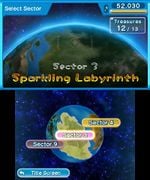
- Main article: Hey! Pikmin planet.
Hey! Pikmin takes place on a separate planet to the main series, very similar to PNF-404, but with a different continental layout and different creatures. Its official name is unknown.
Planets in the story
These planets are never visited in gameplay, but are mentioned in various cutscenes and dialog. Excluding Hocotate and Koppai, they are listed in the order of the ID Card section in Pikmin 4.
Hocotate
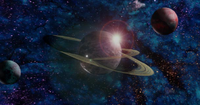
- Main article: Hocotate.
Hocotate first appeared in Pikmin, and is the first planet other than PNF-404 introduced to the series and has appeared in every game since to varying degrees. Its biggest appearance is in Pikmin 2, where the opening cutscene showed the planet to have two rings around it and an orange coloration, with two moons. The surface of the planet is also shown in this cutscene, where it is depicted as an arid and sandy environment. The planet's name comes from the address of Nintendo's headquarters at Hokotate-cho in Kyoto.
The following characters are from Hocotate:
Koppai
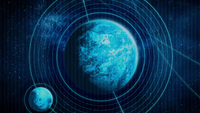
- Main article: Koppai.
Koppai first appeared in Pikmin 3 where it is shown in the opening cutscene with one moon, however, the image used to depict Koppai in this shot is actually a slightly edited version of 'The Blue Marble', a NASA photograph of Earth.[1] Although its surface is never shown, Alph makes comparisons to Tropical Wilds and Twilight River. Its gravity is described as being 10x that of PNF-404 and its oxygen concentration is roughly one third of PNF-404's. The planet's name comes from Nintendo's original name, "Nintendo Koppai".
The following characters are from Koppai:
Karut
Karut is a planet introduced in Pikmin 4, however nothing is known about it currently. Its name comes from Karuta playing cards, a product Nintendo used to produce.[2]
The following characters are from Karut:
Giya
Giya is a planet introduced in Pikmin 4, being some sort of colonized planet. The first captain of the Rescue Corps, Aral Shepherd, witnessed the colony's reaching of the planet's surface, and according to Paniya Shepherd, Giyans have began to migrate into space. Collin mentions that the colony has walls of some kind that he engaged in cleaning while attending university, and Erma Shepherd mentions a park nearby to the Rescue Corps' headquarters. Its name comes from the location of Nintendo's original headquarters at Kagiya-cho in Kyoto.[2]
The following characters are from Giya:
Ohri
Ohri is a planet introduced in Pikmin 4, however nothing is known about it currently. Its name likely comes from Oike street in Kyoto.[2]
The following characters are from Ohri:
Nijo
Nijo is a planet introduced in Pikmin 4, however nothing is known about it currently. Its name likely comes from Nijo street in Kyoto.[2]
The following characters are from Nijo:
Siguray
Siguray is a planet introduced in Pikmin 4, and is described as having a scorching desert and abundant natural sunlight. Its wildlife includes water-dwelling newts.[3] Its name comes from the Shigureden museum in Kyoto, which Nintendo was heavily involved in the construction of.[2]
The following characters are from Siguray:
Sozor
Sozor is a planet introduced in Pikmin 4, however nothing is known about it currently. Its name likely comes from the name of the musical theme created for Mario's 35th anniversary, "Souzou" by Gen Hoshino.[2]
The following characters are from Sozor:
Moyama
Moyama is a planet introduced in Pikmin 4, however nothing is known about it currently. Its name comes from the Momoyama area of Kyoto.[2]
The following characters are from Moyama:
Flukuey
Flukuey is a planet introduced in Pikmin 4, and is described as having steep rocky mountains with stunning views. Its name comes from the Fukuine area in Kyoto, the site of a previous Nintendo headquarters.[2]
The following characters are from Flukuey:
Enohay
Enohay is a planet introduced in Pikmin 4, however nothing is known about it currently. Its name comes from the abbreviation for Nintendo of America, "NoA".[2]
The following characters are from Enohay:
Mihama
Mihama is a planet introduced in Pikmin 4, however nothing is known about it currently. Its name may come from the Nintendo Mihama Dormitory.[2]
The following characters are from Mihama:
Ooji
Ooji is a planet introduced in Pikmin 4, and is described as having a lush jungle and relaxing environment. Its name may come from Nintendo's Uji Ogura Plant or Uji Okubo Plant.
The following characters are from Ooji:
Ogura
Ogura is a planet introduced in Pikmin 4, however nothing is known about it currently. Its name comes from Nintendo's Uji Ogura Plant, which was used for manufacturing playing cards and Hanafuda cards, and for product repairs. It has since been renovated into the Nintendo Museum.
The following characters are from Ogura:
Conohan
Conohan is a planet introduced in Pikmin 4, however nothing is known about it currently. Its name probably comes from Konohana, a hanafuda set once produced by Nintendo.[2]
The following characters are from Conohan:
Ocobo
Ocobo is a planet introduced in Pikmin 4, and is described as being perpetually stormy, only have one day of clear sky every year. It has been completely flooded over by its rains resulting in its continents all being submerged, so its population lives on artificially made islands instead. Its name comes from Nintendo's Uji Okubo Plant.
The following characters are from Ocobo:
Tagwa
Tagwa is a planet introduced in Pikmin 4. Not much is known about it, but it is suggested that the planet has run out of drinkable water. Its name may come from Udagawachō, the district where Nintendo TOKYO, Japan's first Nintendo store, is located.
The following characters are from Tagwa:
Enohee
Enohee is a planet introduced in Pikmin 4, however nothing is known about it currently. Its name comes from the abbreviation for Nintendo of Europe, "NoE".[2]
The following characters are from Enohee:
Neechki
Neechki is a planet introduced in Pikmin 4, however nothing is known about it currently. Its name likely comes from Nishiki street in Kyoto.[2]
The following characters are from Neechki:
Koodgio
Koodgio is a planet introduced in Pikmin 4, however nothing is known about it currently. Its name likely comes from Kujo street in Kyoto.[2]
The following characters are from Koodgio:
Maxima
Maxima is a planet introduced in Pikmin 4, however nothing is known about it currently. Its name comes from the Makishima area in Kyoto, where the Nintendo Museum is located.[2]
The following characters are from Maxima:
Minor planets
|
This article or section is in need of more images. Particularly: |
There are a few planets in Pikmin 2 and Pikmin 3 that aren't mentioned and are only seen in each game's opening scene, which both show shots of space. They are purely aesthetic, and don't appear or are mentioned anywhere else in the games or series. In Pikmin 3, lots of these planets are nearly identical, but there are still distinguishable "types".
Pikmin 2
Yellow planet
This planet is large, yellow, and has three moons. Hocotate Freight is shown to have delivered supplies to it. The moons are colored green, orange, and blue.
Pikmin 3
Spherical planets
Most of these planets are perfectly rounded, pearly spheres, resembling the gas giants Uranus and Neptune. Others, seen in the Drake's takeoff scene seem to have a more rocky texture. None of these planets have moons.
Asteroid planets
These planets are rigid and rocky, and might as well be asteroids. This may suggest that they are quite small, as small planets in real life often develop strange shapes because of a lack of gravity.
Pikmin 4
Icebound planets
Captain Olimar mentions "a few icebound planets" that he visited while delivering cargo in his notes for the Ice Sword, which based on his apt description of the planets being "icebound", are probably completely covered in ice. Since Olimar mentions he had visited these planets while delivering cargo, it is likely that most of these are colonized and have life. Although unconfirmed, it is possible that these "icebound" planets actually correspond to some planet names revealed in Pikmin 4.
Names in other languages
Karut
| Language | Name | Meaning |
|---|---|---|
| カルタ星? Karuta-sei |
Planet Karuta | |
(traditional) |
卡魯塔星 Kǎ lǔ tǎ xīng |
- |
(simplified) |
卡鲁塔星 Kǎ lǔ tǎ xīng |
- |
| Karout | - | |
| 카루타 행성 Karuta Haengseong |
Planet Karuta | |
| Karut | - |
Giya
| Language | Name | Meaning |
|---|---|---|
| カギヤ星? Kagiya-sei |
Planet Kagiya | |
(traditional) |
卡基亞星 Kǎ jī yà xīng |
- |
(simplified) |
卡基亚星 Kǎ jī yà xīng |
- |
| Ghiya | - | |
| 카기야 행성 Kagiya Haengseong |
Planet Kagiya | |
| Giya | - | |
| Giya | - |
Ohri
| Language | Name | Meaning |
|---|---|---|
| オーイ星? Ōi-sei |
Planet Ohri | |
| Ohri | - | |
| 오오이 행성 Ooi Haengseong |
Planet Ōi | |
| Ohri | - |
Nijo
| Language | Name | Meaning |
|---|---|---|
| ニジョウ星? Nijō-sei |
Planet Nijo | |
| Nijo | - | |
| 니조 행성 Nijo Haengseong |
Planet Nijō |
Siguray
| Language | Name | Meaning |
|---|---|---|
| シグレ星? Shigure-sei |
Planet Siguray | |
(traditional) |
士古列星 Shì gǔ liè xīng |
- |
(simplified) |
士古列星 Shì gǔ liè xīng |
- |
| Siguray | - | |
| 시구레 행성 Sigure Haengseong |
Planet Shigure | |
| Siguray | - |
Sozor
| Language | Name | Meaning |
|---|---|---|
| ソーゾー星? Sōzō-sei |
Planet Sōzō | |
| Sozor | - | |
| 소조 행성 Sojo Haengseong |
Planet Sōzō | |
| Sozor | - |
Moyama
| Language | Name | Meaning |
|---|---|---|
| モモヤマ星? Momoyama-sei |
Planet Momoyama | |
| Moyama | - | |
| 모모야마 행성 Momoyama Haengseong |
Planet Momoyama |
Flukuey
| Language | Name | Meaning |
|---|---|---|
| フクイヌ星? Fukuinu-sei |
Planet Fukuinu | |
| Flukuey | - | |
| 후쿠이네 행성 Hukuine Haengseong |
Planet Fukuine |
Enohay
| Language | Name | Meaning |
|---|---|---|
| ノア星? Noa-sei |
Planet NoA | |
| Enohay | - | |
| 노아 행성 Noa Haengseong |
Planet NoA |
Mihama
| Language | Name | Meaning |
|---|---|---|
| ミハマ星? Mihama-sei |
Planet Mihama | |
| Mihama | - | |
| 미하마 행성 Mihama Haengseong |
Planet Mihama |
Ooji
| Language | Name | Meaning |
|---|---|---|
| ウジ星? Uji-sei |
Planet Ooji | |
(traditional) |
烏吉星 Wūjí xīng |
- |
(simplified) |
乌吉星 Wūjí xīng |
- |
| Ouji | - | |
| 우지 행성 Uji Haengseong |
Planet Uji | |
| Uji | - |
Ogura
| Language | Name | Meaning |
|---|---|---|
| オグラ星? Ogura-sei |
Planet Ogura | |
| Ogura | - | |
| 오구라 행성 Ogura Haengseong |
Planet Ogura |
Conohan
| Language | Name | Meaning |
|---|---|---|
| コノハナ星? Konohana-sei |
Planet Conohana | |
| Conohan | - | |
| 코노하나 행성 Konohana Haengseong |
Planet Konohana |
Ocobo
| Language | Name | Meaning |
|---|---|---|
| Ocobo | - | |
| 오쿠보 행성 Okubo Haengseong |
Planet Ōkubo |
Tagwa
| Language | Name | Meaning |
|---|---|---|
| ウダガワ星? Udagawa-sei |
Planet Udagawa | |
| Tagwa | - | |
| 우다가와 행성 Udagawa Haengseong |
Planet Udagawa |
Enohee
| Language | Name | Meaning |
|---|---|---|
| ノエ星? Noe-sei |
Planet NoE | |
| Enohee | - | |
| 노에 행성 Noe Haengseong |
Planet NoE |
Neechki
| Language | Name | Meaning |
|---|---|---|
| ニシキ星? Nishiki-sei |
Planet Nishiki | |
| Nichki | - | |
| 니시키 행성 Nishiki Haengseong |
Planet Nishiki |
Koodgio
| Language | Name | Meaning |
|---|---|---|
| クジョウ星? Kujō-sei |
Planet Kujō | |
| Koudjio | - | |
| 쿠조 행성 Kujo Haengseong |
Planet Kujō |
Maxima
| Language | Name | Meaning |
|---|---|---|
| マキシマ星? Makishima-sei |
Planet Makishima | |
| Maxima | - | |
| 마키시마 행성 Makishima Haengseong |
Planet Makishima |
References
- ^ YouTube video showing the similarity between Koppai and The Blue Marble, published on May 10th, 2022, retrieved on May 10th, 2022
- ^ a b c d e f g h i j k l m n o Planet names and their inspirations - r/Pikmin on Reddit
- ^ “The iridescent pattern reminds of a water-dwelling newt found on my home planet.” – Schnauz in his Treasure Catalog notes for the Newtolite Shell
